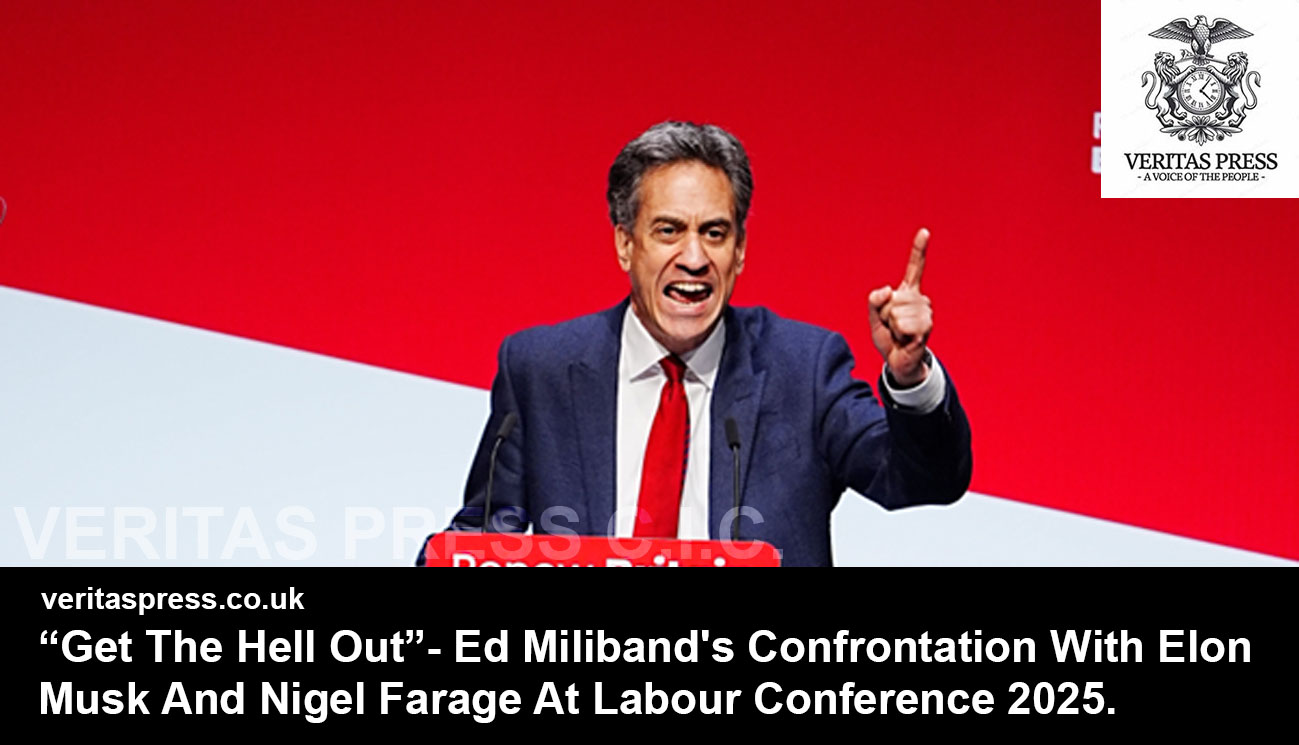Press Release: Veritas Press C.I.C.
Author: Kamran Faqir
Article Date Published: 01 Oct 2025 at 13:30 GMT
Category: UK | Politics | Labour Conference 2025
Source(s): Veritas Press C.I.C. | Multi News Agencies
Business Ads


At the 2025 Labour Party Conference in Liverpool, Energy Secretary Ed Miliband delivered a forceful critique of Elon Musk and Nigel Farage, accusing them of undermining British democracy and promoting divisive ideologies. Miliband’s remarks have ignited a broader debate about the influence of foreign billionaires in UK politics and the rise of populist movements.
Miliband’s Critique of Elon Musk:
Miliband’s condemnation of Elon Musk centred on the billionaire’s involvement in UK politics, particularly his appearance at a far-right rally organised by Tommy Robinson. Musk’s statement that “violence is coming” and his call to “fight back or die” were met with widespread criticism from UK political leaders, including Prime Minister Keir Starmer, who labelled Musk’s language as “dangerous and inflammatory”.
Miliband accused Musk of attempting to influence UK politics from abroad, stating, “He thinks he can tell us how to run Britain. Conference, we have a message for Elon Musk: Get the hell out of our politics and our country”. This sentiment reflects growing concerns about the role of foreign billionaires in domestic political affairs.
In response to Musk’s involvement in UK politics, the British political campaign group “Everyone Hates Elon” was formed in 2025. The group aims to voice opposition to Musk and other billionaires, citing their behaviour in government and promotion of disinformation.
Nigel Farage And Reform UK: A Threat To National Unity?
Miliband also directed criticism at Nigel Farage and his party, Reform UK, labelling them as “ideological extremists” and accusing them of undermining public trust and promoting divisive rhetoric. Prime Minister Keir Starmer echoed these sentiments, framing the upcoming general election as a “defining choice” between Labour’s vision of national renewal and Reform UK’s divisive agenda.
However, some within the Labour Party have questioned the focus on Farage and Reform UK, arguing that it may inadvertently elevate their profile and shift the political discourse towards issues where Reform UK holds strong positions, such as immigration.
The Broader Implications:
Miliband’s remarks highlight a growing concern about the influence of foreign billionaires in domestic politics and the rise of populist movements that challenge traditional political norms. While his criticism of Musk and Farage resonates with many who view these figures as threats to democratic values, it also raises questions about the appropriate balance between free speech and the protection of democratic institutions.
The formation of groups like “Everyone Hates Elon” indicates a grassroots response to perceived external interference in UK politics. These movements reflect a broader unease about the concentration of power among a few wealthy individuals and their ability to shape public discourse and policy.
Conclusion: The Stakes Of Musk, Farage, And The UK’s Political Integrity.
Ed Miliband’s confrontation with Elon Musk and Nigel Farage at the Labour Party Conference underscores the complex interplay between domestic politics and global influences. As the UK approaches the next general election, the debate over the role of foreign billionaires and populist movements in shaping political outcomes is likely to intensify. The challenge for political leaders will be to navigate these dynamics while upholding democratic values and ensuring that the voices of ordinary citizens remain at the forefront of the political process.
Musk’s repeated interventions, from threatening “violence” at a far-right rally to publicly questioning the legitimacy of the UK government, illustrate how immense wealth can be leveraged to bypass traditional political accountability. His involvement is not merely rhetorical; reports indicate Musk has considered direct financial support to Farage’s Reform UK, suggesting a calculated strategy to reshape British politics in ways that favour extremist narratives and deregulated markets.
Farage’s partnership with Musk signals the rise of a globally networked far-right, one that conflates populist grievance with foreign financial backing, weaponising social media to amplify division. Miliband’s framing of this as a threat to “the ties that bind our communities and our way of life” is a stark acknowledgement that the UK faces more than partisan competition; it faces a challenge to the very norms and institutions underpinning democracy.
The Labour leadership’s confrontational stance exposes the deeper tension at play: the collision of national political sovereignty with the power of international actors who operate outside legal and ethical norms, yet wield outsized influence through wealth, platforms, and media manipulation. The question Miliband leaves unanswered is whether existing safeguards are sufficient to protect the UK from political interference by global elites, or whether more robust legal and regulatory frameworks are urgently needed.
Ultimately, this episode is a cautionary tale: democracy cannot be defended solely through rhetoric. It requires vigilance, transparency, and mechanisms to ensure that the corridors of power remain accountable to citizens, not to foreign billionaires or ideologically driven outsiders. The Miliband-Musk-Farage confrontation signals the beginning of a deeper reckoning over the influence of money, media, and ideology on British political life, a struggle that will define the nation’s democratic resilience in the coming decade.


























